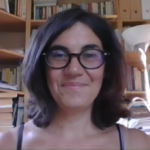 Sara Trovato ha conseguito il dottorato di ricerca in Philosophie et Lettres nel 2000 presso l’Université Catholique de Louvain.
Sara Trovato ha conseguito il dottorato di ricerca in Philosophie et Lettres nel 2000 presso l’Université Catholique de Louvain.
Ha lavorato in varie università italiane, insegnando Didattica per studenti Sordi, Sociologia dell’educazione, Letteratura italiana, Sociologia generale, Metodologia della ricerca sociologica, Filosofia politica.
Ha pubblicato articoli sia teorici che empirici sul diritto alla lingua dei segni, sui bambini sordi nella scuola dell’infanzia, sulla condizione educativa e sociale delle persone sorde.
Nel settore della didattica per studenti sordi, ha coordinato ed è co-autrice di Corso di italiano per chi non sente (e per i suoi compagni udenti) (2013, Milano: Raffaello Cortina), il primo libro di italiano per studenti Sordi dagli 11 anni di età in su. Ha anche pubblicato Insegno in segni. Linguaggio, cognizione, successo scolastico per studenti Sordi (2014, Milano: Raffaello Cortina), opera rivolta a docenti e professionisti che lavorano con adolescenti Sordi.
Nel dominio dell’insegnamento della lingua dei segni, ha coordinato ed è co-autrice di Insegnare e imparare la LIS. Attività e materiali per il docente, lo studente e l’autoapprendimento (2020, Trento: Erickson).
Attualmente insegna lingua italiana presso l’Istituto Italiano di Cultura di Parigi.